What does PSHE stand for?
And is it the same as RSHE?
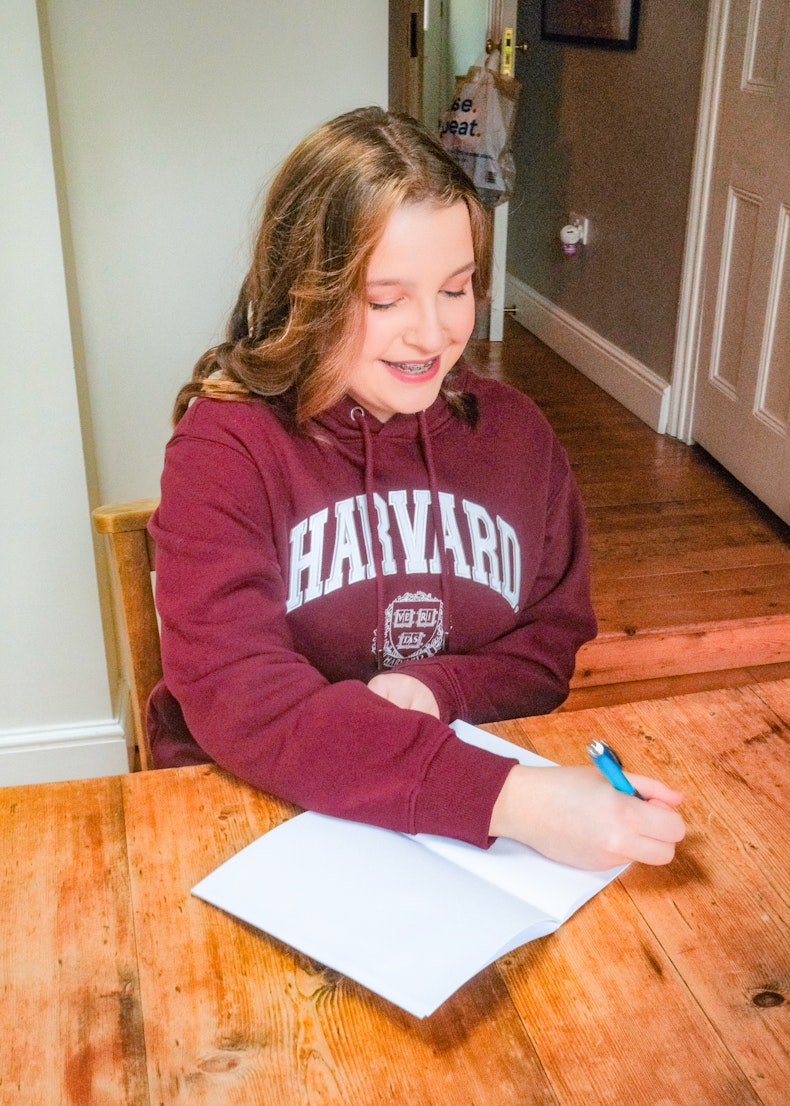
Updated January 15, 2026
In this article
PSHE meaning
PSHE stands for Personal, Social, Health, and Economic education.
It’s a subject taught in schools in England that helps children and young people learn about wellbeing, relationships, safety, and life skills needed for adulthood and work.

PSHE stands for Personal, Social, Health, and Economic education. It’s a key part of the school curriculum in England.
PSHE helps children and young people stay healthy, safe, and ready for life and work in modern Britain.
But PSHE isn’t just limited to schools; parents play a crucial role too.
While schools provide structured lessons, much of a child’s learning about relationships, wellbeing, and decision-making happens at home.
As a parent, it can be helpful to understand what PSHE means to support your child, and that’s why we prepared this article for you.
Keep reading to learn what is PSHE in school and how you can support your child through this.
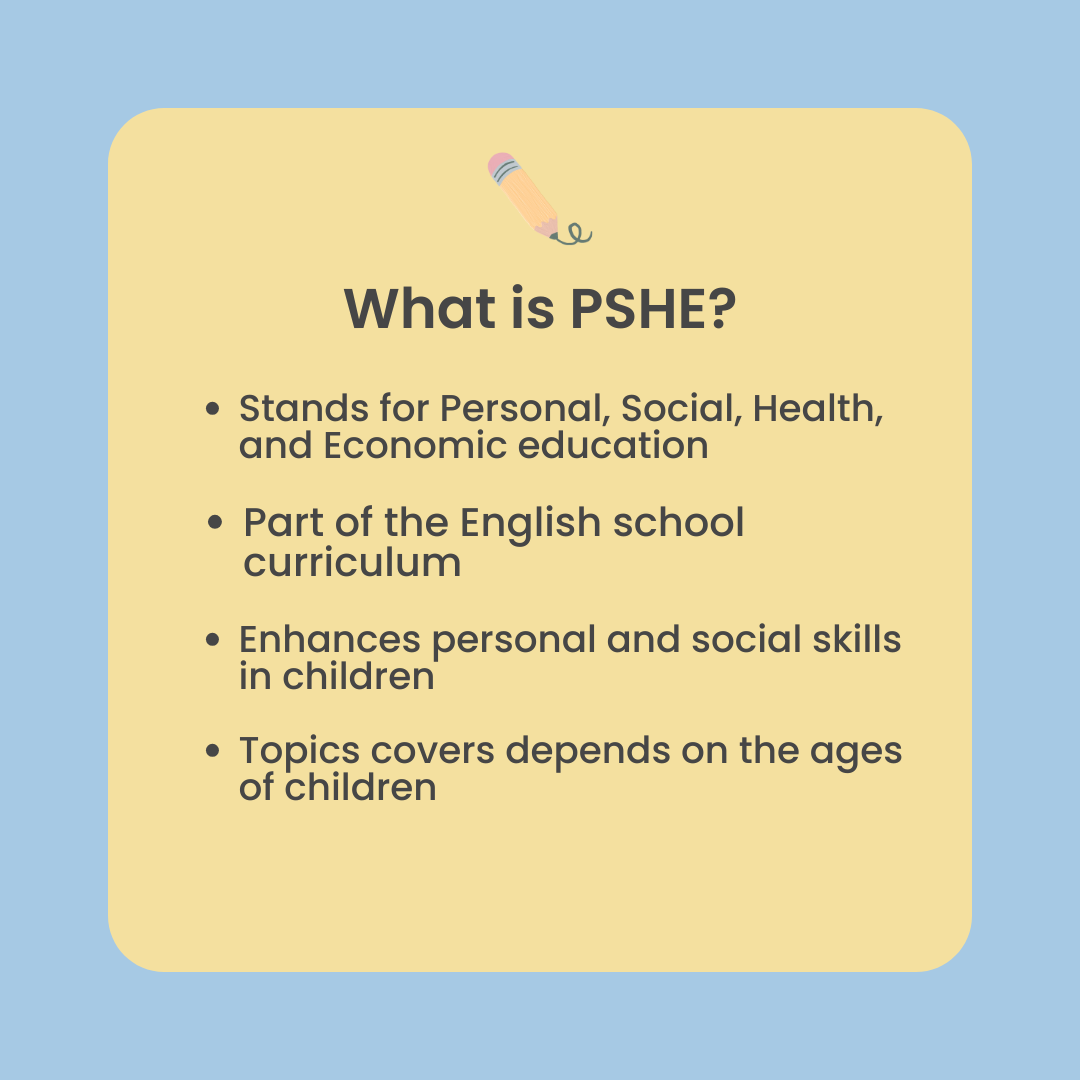
What does PSHE mean and what’s your role as a parent?
PSHE (Personal, Social, Health, and Economic Education) is more than just a school subject; it’s a key to emotional wellbeing, strong relationships, and future success.
By understanding the PSHE meaning, you can support your child’s learning beyond the classroom.
You can:
- Help your child build emotional resilience and confidence
- Reinforce values of respect, empathy, and communication
- Guide them in making informed and responsible choices
- Create a safe space for open and honest conversations
- Keep your child engaged to make PSHE lessons more impactful in real-life
Why is PSHE important?
While science, maths, and other core subjects often take centre stage, the importance of PSHE in school shouldn't be overlooked.
Beyond academic success, it's likely you'd love to see your child ready to thrive in the real world.
And that's what PSHE can help with.
It plays a vital role in shaping your child's emotional intelligence, decision-making, and sense of responsibility.
Some key benefits of PSHE are:
- Emotional wellbeing: helps children manage stress, understand their emotions, and build self-confidence
- Healthy relationships: teaches respect, consent, and communication skills, both online and offline
- Life skills: equips your child with financial literacy, career readiness, and problem-solving abilities
- Safety awareness: educates about online safety, peer pressure, and how to seek help when needed
What subjects are covered in PSHE?
PSHE covers a wide range of topics that are essential for students' personal and social growth.
The curriculum is designed to be age-appropriate and relevant to students at different stages.
Primary school (ages 5-11)
In primary school, PSHE education focuses on the basics of healthy, respectful relationships, both offline and online.
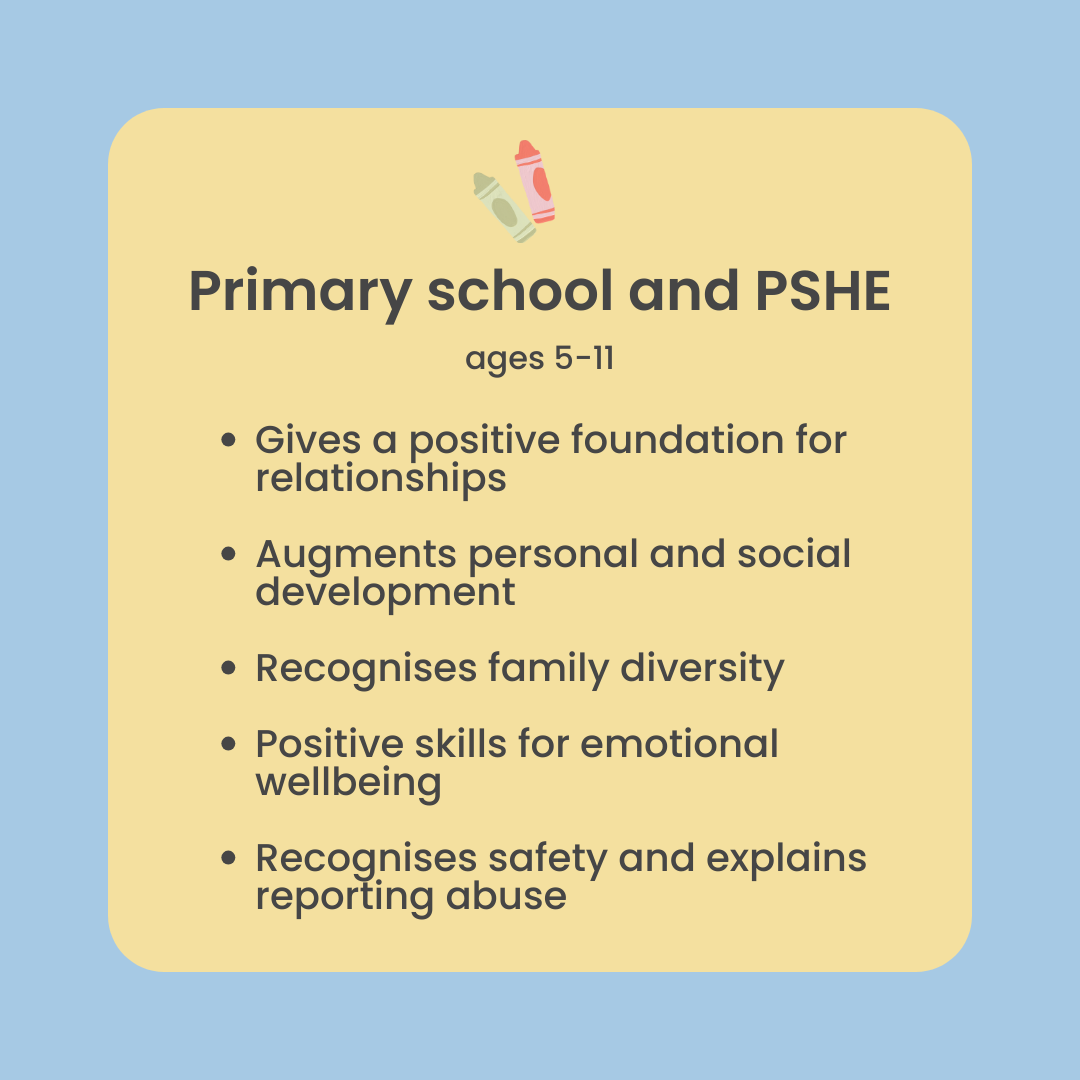
The main topics include:
- Foundations of relationships: understanding positive relationships with family, friends, and peers
- Personal and social Development: learning values like kindness, respect, honesty, and consent
- Family diversity: recognising and respecting different family structures
- Emotional wellbeing: understanding emotions, mental health, and the role of friendships in emotional wellbeing
- Safety and reporting abuse: knowing how to recognise and report abuse, understand personal boundaries, and seek help
While sex education is not required in primary schools, teachers may address questions about sex and sexuality if they come up, ensuring students get safe and accurate information.
The government recognises in their own RSE (Relationships and Sex Education) guidelines that young people may be resorting to unsafe browsing to fulfil their curiosity if caregivers do not answer their questions appropriately.
Secondary school / high school (ages 11+)
In secondary school, PSHE builds on what was learned in primary school and introduces more complex topics.
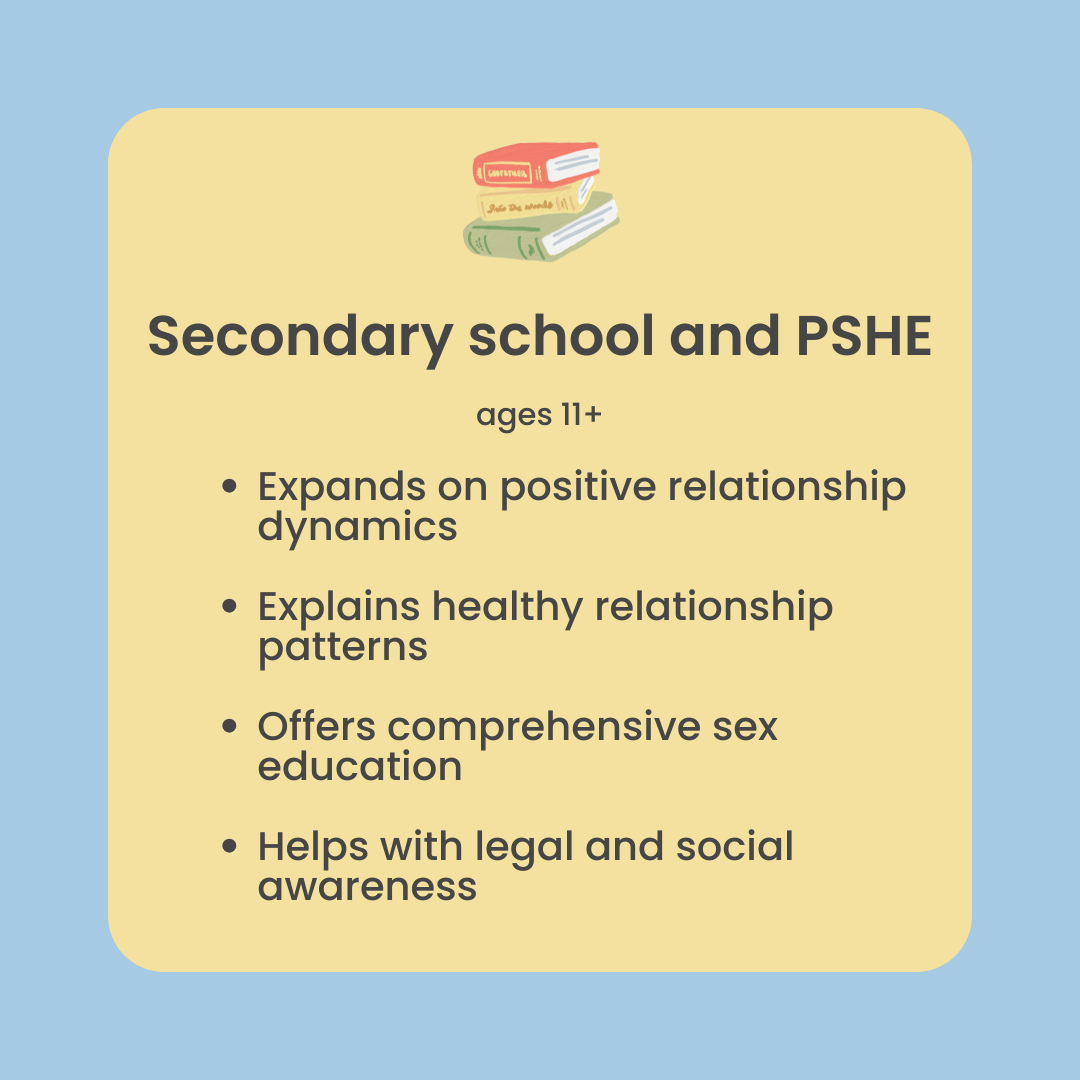
The curriculum includes:
- Expanded relationship dynamics: exploring different types of relationships, including intimate relationships, friendships, and family dynamics
- The manosphere: as of 2025, there will be a new topic which is ‘Addressing misogyny, toxic masculinity and social media influence through PSHE education’
- Healthier relationship patterns: learning about healthy relationships, consent, conflict management, and recognising abusive behaviours
- Sex education: comprehensive information about sexual health, contraception, reproductive choices, and sexual orientation
- Legal and social awareness: understanding the legal aspects of relationships, rights, responsibilities, and issues like gender equality, domestic abuse, online safety, and exploitation
What does RSHE stand for?
RSHE stands for Relationships, Sex, and Health Education. This term is often used alongside PSHE but focuses specifically on relationships and sex education. While PSHE covers a broader range of topics, RSHE zeroes in on relationships and sexual health.
RSHE meaning and how is it different from PSHE?
RSHE stands for Relationships, Sex, and Health Education. This term is often used alongside PSHE but focuses specifically on relationships and sex education.
While PSHE covers a broader range of topics, RSHE zeroes in on relationships and sexual health.
So what is the difference between PSHE and RSHE?
While PSHE and RSHE cover similar areas, there are some key differences:
- PSHE: includes Personal, Social, Health, and Economic education. It covers a wide range of topics aimed at the overall development of students
- RSHE: focuses specifically on Relationships, Sex, and Health Education. RSHE is a part of PSHE, with a specific focus on relationships and sexual health
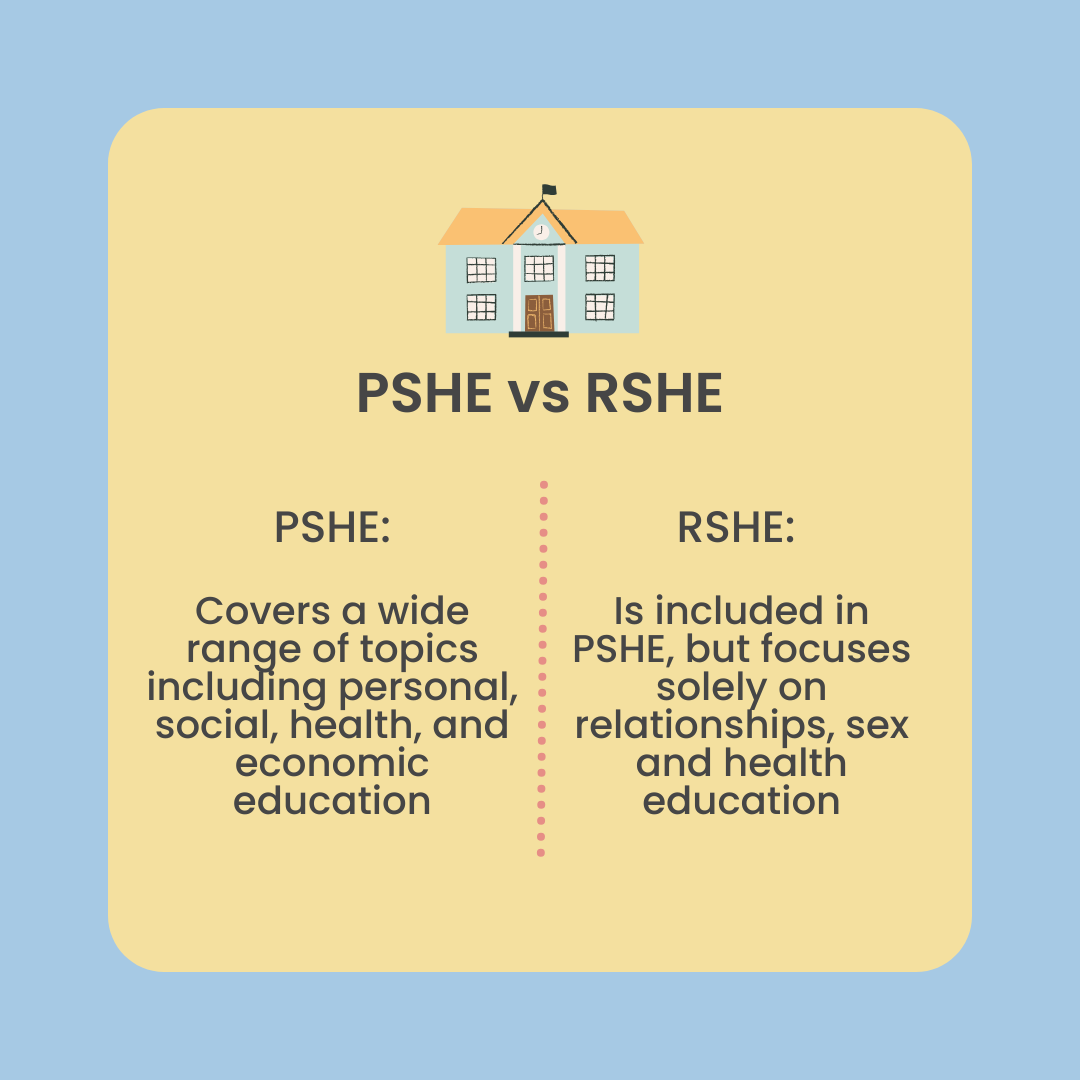
We hope this article has helped you!
We want to help you to understand these topics better, especially if your child is about to start learning them in primary school.
For secondary school students, the luna app (we are luna – available in app stores) is the perfect companion to PSHE education.
It offers engaging, content that's been checked by doctors, designed to align with the PSHE curriculum.

How we created this article:
luna's team of experts comprises GPs, Dermatologists, Safeguarding Leads and Junior Doctors as well as Medical Students with specialised interests in paediatric care, mental health and gynaecology. All articles are created by experts, and reviewed by a member of luna's senior review team.
Sources:
Department of Education "Relationships Education, Relationships and Sex Education (RSE) and Health Education" | Accessed 19.03.25
https://assets.publishing.service.gov.uk/media/62cea352e90e071e789ea9bf/Relationships_Education_RSE_and_Health_Education.pdfWe'd love to keep in touch!
Sign up to our parent newsletter for emails on the latest teen trends, insights into our luna community and to keep up to date
By signing up, you are agreeing that we can use your email address to market to you. You can unsubscribe from marketing emails at any time by using the link in our emails. For more information, please review our privacy statement.